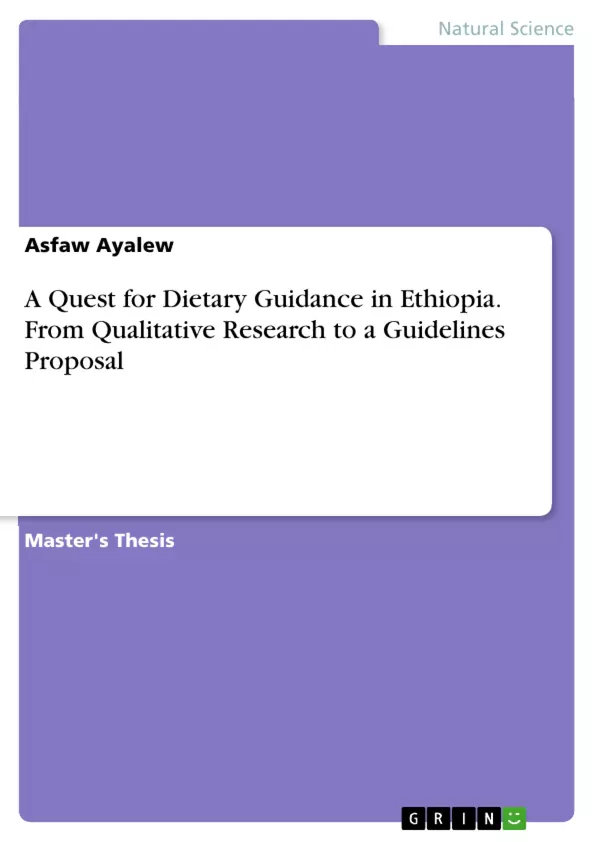Properly designed and evidence-based dietary guidelines make it easier for people to adopt healthy eating and lifestyle patterns that would promote their overall health and decrease their risk of acquiring diet-related chronic diseases (DRCDs). However, Ethiopia currently lacks this important public health tool. This study seeks to propose key diet and physical activity recommendations through soliciting experts’ perspectives and critical review of relevant documents.
A qualitative study was conducted in Addis Ababa city among key informants. Experts from eight organizations and institutions having interest in nutrition and health issues were purposively selected. Using a topic guide, data were generated through face-to-face in depth interviews with 10 experts. The interviews were audio-recorded, transcribed and thematic analysis was performed. To complement with the interview of key informants, reviews of selected global as well as national documents were carried out, and the data generated thereof were summarized.
Diet and health are closely related and nutrient deficiencies, diet–related chronic diseases as well as their risk factors are rampant, while food security remains a concern. Diet and nutrition literacy is said to be low, in Ethiopia. World-wide, about one-third of countries (five in Africa) have dietary guidelines, whose core messages are reasonably similar. Cognizant of the prevailing situation, some national strategic documents and interviewed experts are in favor of placement of dietary guidelines.
The dietary habits and lifestyles of the populace are sub-optimal and they need to be improved timely through multi-sectorial efforts that include nutrition information and education, based on appropriate dietary guidelines.
Inhaltsverzeichnis (Table of Contents)
- 1. INTRODUCTION
- 1.1. Background
- 1.2. Problem Statement
- 1.3. Objective of the study
- 1.4. Scope of the study
- 1.5. Significance of the study
- 2. LITERATURE REVIEW
- 2.1. Global level influences on food choice
- 2.2. National level influences on food choice
- 2.3. Community level influences on food choice
- 2.4. Individual level influences on food choice
- 2.5. The role of Food Based Dietary Guidelines in influencing the food environment
- 3. METHODOLOGY
- 4. RESULTS AND DISCUSSION
- 4.1. Perceptions of experts about local lifestyles, consequences, and dietary guidance
- 4.2. Major diet and nutrition-related problems in Ethiopia
- 4.3. Nutrients of public health importance
- 4.4. Contemporary food-consumption patterns in Ethiopia
- 4.5. Selected food-based dietary guidelines around the world
Zielsetzung und Themenschwerpunkte (Objectives and Key Themes)
The study aims to propose key diet and physical activity recommendations for Ethiopia by gathering expert perspectives and critically reviewing relevant documents. The research focuses on addressing the lack of evidence-based dietary guidelines in the country, which are crucial for promoting healthy eating habits and reducing the risk of diet-related chronic diseases.
- Impact of diet and nutrition on health in Ethiopia
- The role of dietary guidelines in influencing food choice and health outcomes
- Analysis of current dietary habits and trends in Ethiopia
- Review of global dietary guidelines and their relevance to Ethiopia
- Development of evidence-based dietary recommendations tailored to the Ethiopian context
Zusammenfassung der Kapitel (Chapter Summaries)
The introductory chapter lays out the background, problem statement, objectives, scope, and significance of the study. It highlights the importance of dietary guidelines in promoting healthy eating habits and preventing diet-related chronic diseases, while acknowledging the absence of such guidelines in Ethiopia.
Chapter 2 delves into the literature review, examining the global and national influences on food choice, as well as community and individual-level factors. It explores the role of food-based dietary guidelines in influencing the food environment and emphasizes their crucial role in shaping dietary choices.
Chapter 3 presents the methodology employed in the study, focusing on the qualitative approach and the selection of key informants. It details the data collection process through in-depth interviews and the use of thematic analysis to interpret the findings. This chapter also outlines the review of relevant national and international documents to complement the data gathered from expert interviews.
Chapter 4 presents the results and discussion of the study. It covers the perceptions of experts on local lifestyles, dietary consequences, and the need for dietary guidance. The chapter also explores major diet and nutrition-related problems in Ethiopia, including nutrient deficiencies and the prevalence of diet-related chronic diseases. It examines contemporary food consumption patterns in Ethiopia and reviews selected food-based dietary guidelines from around the world.
Schlüsselwörter (Keywords)
The study revolves around the key concepts of dietary guidelines, food groups, diet-related chronic diseases, and nutrition education in the Ethiopian context. It also explores the influence of various factors on food choice, ranging from global influences to individual-level factors. The study aims to contribute to the development of evidence-based dietary recommendations that are tailored to the specific needs and circumstances of the Ethiopian population.
Frequently Asked Questions
Why does Ethiopia need national dietary guidelines?
Ethiopia currently lacks evidence-based guidelines, which are essential to combat nutrient deficiencies and the rising prevalence of diet-related chronic diseases (DRCDs).
What were the findings regarding nutrition literacy in Ethiopia?
The study indicates that diet and nutrition literacy is generally low in Ethiopia, contributing to sub-optimal dietary habits and lifestyle patterns.
How was the data for this study collected?
Data was gathered through qualitative in-depth interviews with 10 experts from various health and nutrition organizations, supplemented by a review of global and national documents.
What role does food security play in Ethiopia's dietary context?
Despite the rise in chronic diseases, food security remains a significant concern that must be balanced with healthy eating recommendations.
What is the proposed solution to improve public health in Ethiopia?
The study suggests multi-sectoral efforts including nutrition education and the formal implementation of appropriate, evidence-based dietary guidelines.
- Quote paper
- Dr. Asfaw Ayalew (Author), 2017, A Quest for Dietary Guidance in Ethiopia. From Qualitative Research to a Guidelines Proposal, Munich, GRIN Verlag, https://www.grin.com/document/452113



